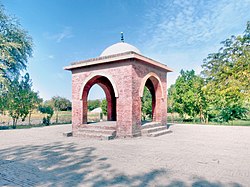Umerkot
Umerkot
Sindhi: امرڪوٽ(Amarkot) | |
|---|---|
 Birthplace of Akbar | |
| Country | Pakistan |
| Province | Sindh |
| Metropolitan Corporation | Pre-islamic Hindu-era |
| Time zone | UTC+05:00 (PKT) |

Umerkot (Urdu: عُمركوٹ, Sindhi: عمرڪوٽ), is a town in Umerkot District in the Sindh province of Pakistan. The city is well connected with the other large cities like Karachi, the provincial capital and Hyderabad.[1]
History
The name of the city is said to be after the name of a local ruler, Umer, who is part of the legend of Umar Marvi. The story also appears in Shah Jo Risalo and is one of the popular tragic romances from Sindh.
The city of Umerkot was the capital of Greater Sindh Province, including some parts of the present Rajasthan state of India.[when?][citation needed] The province was ruled by Sodha Rajputs, one of the subclans of Paramara Rajputs. The city held prominence during the Mughal Empire and the British Raj. Mughal Emperor Akbar was born in Umerkot 14 October 1542 when his father Humayun fled from the military defeat at the hands of Sher Shah Suri.[2] Rana Prasad, a Sodha Rajput ruler of Umerkot, gave him refuge.[3] Later on, Akbar brought northwestern India, including modern day Pakistan under Mughal rule. During Akbar's rule, Rana Megraj, then governor of Umerkot Fort. Abdul Rahim Khan-I-Khana, an important minister (Dewan) of Akbar, upon his visit to Sindh showed a desire to be relative of Rana Megraj. Rana Megraj's niece and daughter of Man Sing was married to Khan-i-Khanan.[4] The dispute over the governorship erupted after the death of Rana Megraj.[5]
Umerkot is one of the few areas that has never been conquered by any invader.[citation needed]
Points of interest
Umerkot has many sites of historical significance such as Akbar's birthplace at Umarkot Fort.
Rana Chandra Singh Sodha (1931–2009) was the Rana of the former Umerkot jagir after 1947, and remained a member of National Assembly of Pakistan and a federal minister.[6]
Umerkot Shiv Mandir
There is an ancient temple, Shiv Mandir, Umerkot.
Folklore
The story of Umar Marvi is that Marvi was a young Thari girl abducted by then-ruler, Umar, who wanted to marry her because of her beauty. Upon her refusal she was imprisoned in the historic Umerkot Fort for several years. Because of her courage, Marvi is regarded as a symbol of love for one's soil and homeland.
Education
The city has more than 100 schools, 20 colleges and one polytechnic college.
See also
Gallery
-
Umarkot Fort
-
Umarkot Museum
References
- ^ http://www.umerkot.gos.pk/
- ^ Part 10:..the birth of Akbar Humayun nama by Gulbadan Begum.
- ^ Part 10:..the birth of Akbar Humayun-nama by Gulbadan Begum.
- ^ Khan, Ansar Zahid. 1986. The Mughul Marriages: A Politico-Religious and Legal Study. Journal of the Pakistan Historical Society 34(2).
- ^ Beg-Lar-Nama. "The Sacking of 'Umarkot". www.infinityfoundation.com. Retrieved 27 August 2015.
- ^ Guriro, Amar (2 August 2009). "Chieftain of Pakistani Hindu Thakurs dies". Daily Times. Retrieved 2 August 2009.


